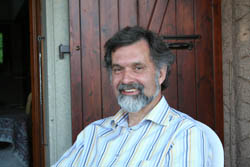15 octobre 2015: Dr Harald Brüssow
Jeudi 15 octobre 2015, 12h30
CMU - A250

Dr. Harald BRÜSSOW
Senior Research Scientist
Nestlé Research Center, Lausanne
«Phage Therapy: Between Hype and Hope - A Reality Test in Bangladesh»
In 2014 the World Health Organization issued a warning that rising antibiotic resistance represents a serious, worldwide threat to public health. Alternative treatment options are thus urgently needed. In 2015 the European Medicines Agency organized a first workshop to discuss the development of bacteriophage therapy. Phage preparations are a registered medicine in Russia, but their composition and clinical efficacy are not documented in detailed scientific publications.
In the talk Dr Brüssow will describe a collaborative effort of the Nestlé Research Center (NRC) in Lausanne and the International Center of Diarrhoeal Diseases Research, Bangladesh (icddr,b) to explore the potential of phage therapy against childhood Escherichia coli diarrhea which is largely antibiotic-resistant in South Asia. We started with the isolation of therapeutic phages from human feces, their genome sequencing, phage cocktail composition, its production in a pilot plant and their safety evaluation in phase I clinical trials. A randomized placebo-controlled phase II clinical trial was subsequently conducted where an NRC phage cocktail of T4-like coliphages and a commercial Russian phage preparation were tested in parallel for clinical efficacy against E. coli diarrhea. No impact on quantitative diarrhea parameter was observed. A detailed follow-up of the fecal microbiota development during the acute and convalescent phase challenges our understanding of E. coli diarrhoea. Even when working with the workhorses of molecular biology like E. coli and phage T4 much remains to be learned about their interaction in their natural environment before phage therapy can become a medical reality.
Biography
With a scholarship of the German National Academic Foundation Harald Brüssow studied biology at the University of Düsseldorf and received his PhD in virology at the Max Planck Institute of Biochemistry in Martinsried. He joined then the Nestlé Research Center in Lausanne / Switzerland where he works in the Host-Microbe Interaction group of the Nutrition and Health Research Department. His industrial research interests were focused on biological approaches against childhood infectious diseases where he explored the use of milk antibodies raised in dairy cows for passive immunity against rotavirus and the use of Lactobacillus probiotics against bacterial diarrhea. In parallel, he conducted sero-epidemiological studies in a national health survey in Ecuador where he investigated the impact of malnutrition on immune response against infectious diseases in young children. Subsequently, he became interested in bacteriophage research where he explored phage genomics, the prevention of bacteriophage infections in industrial food fermentation and the use of bacteriophages as anti-microbial agent against bacterial infections. His current research interest is the modification of the human microbiome by nutritional interventions (prebiotics) to achieve health benefits. He is author of more than 130 scientific publications, of a book (The Quest for Food-A Natural History of Eating; Springer Publisher) and member of the editorial board of The Journal of Bacteriology, Applied and Environmental Microbiology and Microbial Biotechnology.
